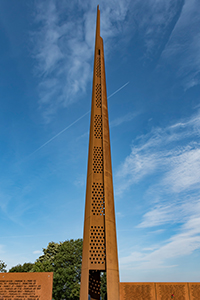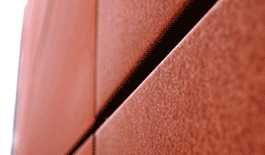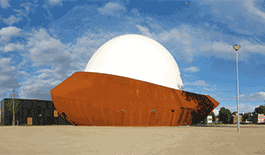
You can now order CorTen steel steel online from MCB! Simply create a list of the products you require using MCB's web portal. And order them for delivery on the date of your choice with a single press of a button!
Weathering characteristics of CorTen steel
The material used for CorTen is an alloy of iron, copper, phosphorus, silicon, nickel and chrome. Due to the effective protective layer, CorTen steel allows you to make savings by eliminating extra surface treatment processes such as galvanising.
CorTen steel owes its good weathering resistance to a tight oxide skin. This layer, the patina, protects the core material against (further) degradation. This protective layer forms naturally through oxidisation when the material is exposed to the elements. In other words ‘normal’ atmospheric conditions.
Only then does the patina layer form on the surface. This process can take months, or even years, depending on local conditions.
Thanks to the patina on the surface, CorTen steel is capable of lasting for decades in outdoor applications. However, the structural design must take a number of important points into consideration. For example, blind holes where water can accumulate should be avoided.
Applicability of CorTen steel
CorTen is often used by architects and artists. In addition, this type of steel is frequently used in a wide variety of applications including:
- Building façade cladding
- Heavy engineering products such as bridges and cranes
- Architecture
- Civil engineering structures
- Flower stands/planters
- Border edging in gardens
Would you like to find out more about the applicability of CorTen steel? MCB will be delighted to help you choose the right material. Please call us on +31 040 20 88 582 or send an email to verkoop@mcb.nl.
Differences between CorTen A and CorTen B
CorTen steel lends itself just as well to processing (bending, machining, etc.) as the corresponding non-alloy engineering steels.
CorTen A is the most popular type of weathering steel. Thanks to the high phosphorus content, CorTen A offers excellent resistance to atmospheric corrosion.
In structures subjected to heavy loads and/or low temperatures, there is an increased risk of brittle fracture. The good notch toughness of CorTen B makes this steel highly suitable for demanding applications. However, a slightly reduced resistance to corrosion must be accepted with this material.

CorTen A
| Applications | Civil engineering structures, chimneys, building cladding, heat exchangers |
Weldability | Weldable using all common welding techniques |

CorTen B
| Applications | Bridges, cranes and refuse collection trucks |
| Weldability | Weldable using all common welding techniques, extremely thick parts may need to be preheated |
Heat treatment processes for CorTen A and CorTen B
| Normal heat treatment | 840 - 950 °C |
| Heat treatment for relieving stress | 550 - 600 °C |
CorTen joints
CorTen steel can be welded to create a joint or a bolted joint can be used. If the correct weld filler metal is used, the welded seam will generally offer the same degree of resistance to corrosion.
Quality: CorTen A & CorTen B
| Weld filler metal | According to |
| Electrodes | EN ISO 2560-A: E 46 5 Z B 32 |
| Welding wire | EN ISO 14171-A: S2Ni1Cu |
Ordering CorTen steel
MCB not only offers a complete range of CorTen plate with all the convenience of our One-Stop-Shop concept, we also welcome the opportunity of contributing tips and ideas.
So you can expect the full support of our product specialists in choosing the right material for your application.
If you would like more information, or have any questions, please contact our sales department on +31 (0)40 20 88 582 or send an email to verkoop@mcb.nl.